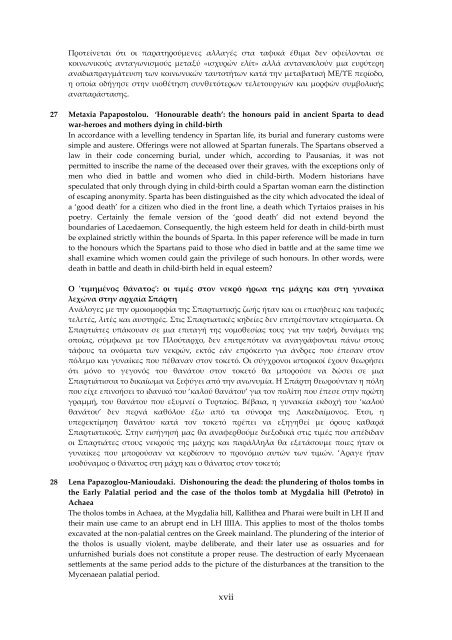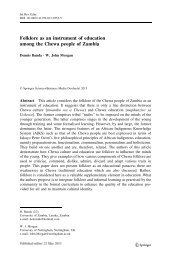Honouring the Dead in the Peloponnese - University of Nottingham
Honouring the Dead in the Peloponnese - University of Nottingham
Honouring the Dead in the Peloponnese - University of Nottingham
Create successful ePaper yourself
Turn your PDF publications into a flip-book with our unique Google optimized e-Paper software.
Προτείνεται ότι οι παρατηρούμενες αλλαγές στα ταφικά έθιμα δεν οφείλονται σε<br />
κοινωνικούς ανταγωνισμούς μεταξύ «ισχυρών ελίτ» αλλά αντανακλούν μια ευρύτερη<br />
αναδιαπραγμάτευση των κοινωνικών ταυτοτήτων κατά την μεταβατική ΜΕ/ΥΕ περίοδο,<br />
η οποία οδήγησε στην υιοθέτηση συνθετότερων τελετουργιών και μορφών συμβολικής<br />
αναπαράστασης.<br />
27 Metaxia Papapostolou. ‘Honourable death’: <strong>the</strong> honours paid <strong>in</strong> ancient Sparta to dead<br />
war-heroes and mo<strong>the</strong>rs dy<strong>in</strong>g <strong>in</strong> child-birth<br />
In accordance with a levell<strong>in</strong>g tendency <strong>in</strong> Spartan life, its burial and funerary customs were<br />
simple and austere. Offer<strong>in</strong>gs were not allowed at Spartan funerals. The Spartans observed a<br />
law <strong>in</strong> <strong>the</strong>ir code concern<strong>in</strong>g burial, under which, accord<strong>in</strong>g to Pausanias, it was not<br />
permitted to <strong>in</strong>scribe <strong>the</strong> name <strong>of</strong> <strong>the</strong> deceased over <strong>the</strong>ir graves, with <strong>the</strong> exceptions only <strong>of</strong><br />
men who died <strong>in</strong> battle and women who died <strong>in</strong> child-birth. Modern historians have<br />
speculated that only through dy<strong>in</strong>g <strong>in</strong> child-birth could a Spartan woman earn <strong>the</strong> dist<strong>in</strong>ction<br />
<strong>of</strong> escap<strong>in</strong>g anonymity. Sparta has been dist<strong>in</strong>guished as <strong>the</strong> city which advocated <strong>the</strong> ideal <strong>of</strong><br />
a ‘good death’ for a citizen who died <strong>in</strong> <strong>the</strong> front l<strong>in</strong>e, a death which Tyrtaios praises <strong>in</strong> his<br />
poetry. Certa<strong>in</strong>ly <strong>the</strong> female version <strong>of</strong> <strong>the</strong> ‘good death’ did not extend beyond <strong>the</strong><br />
boundaries <strong>of</strong> Lacedaemon. Consequently, <strong>the</strong> high esteem held for death <strong>in</strong> child-birth must<br />
be expla<strong>in</strong>ed strictly with<strong>in</strong> <strong>the</strong> bounds <strong>of</strong> Sparta. In this paper reference will be made <strong>in</strong> turn<br />
to <strong>the</strong> honours which <strong>the</strong> Spartans paid to those who died <strong>in</strong> battle and at <strong>the</strong> same time we<br />
shall exam<strong>in</strong>e which women could ga<strong>in</strong> <strong>the</strong> privilege <strong>of</strong> such honours. In o<strong>the</strong>r words, were<br />
death <strong>in</strong> battle and death <strong>in</strong> child-birth held <strong>in</strong> equal esteem?<br />
Ο 'τιμημένος θάνατος': oι τιμές στον νεκρό ήρωα της μάχης και στη γυναίκα<br />
λεχώνα στην αρχαία Σπάρτη<br />
Ανάλογες με την ομοιομορφία της Σπαρτιατικής ζωής ήταν και οι επικήδειες και ταφικές<br />
τελετές, λιτές και αυστηρές. Στις Σπαρτιατικές κηδείες δεν επιτρέπονταν κτερίσματα. Οι<br />
Σπαρτιάτες υπάκουαν σε μια επιταγή της νομοθεσίας τους για την ταφή, δυνάμει της<br />
οποίας, σύμφωνα με τον Πλούταρχο, δεν επιτρεπόταν να αναγράφονται πάνω στους<br />
τάφους τα ονόματα των νεκρών, εκτός εάν επρόκειτο για άνδρες που έπεσαν στον<br />
πόλεμο και γυναίκες που πέθαναν στον τοκετό. Οι σύγχρονοι ιστορικοί έχουν θεωρήσει<br />
ότι μόνο το γεγονός του θανάτου στον τοκετό θα μπορούσε να δώσει σε μια<br />
Σπαρτιάτισσα το δικαίωμα να ξεφύγει από την ανωνυμία. Η Σπάρτη θεωρούνταν η πόλη<br />
που είχε επινοήσει το ιδανικό του ‘καλού θανάτου’ για τον πολίτη που έπεσε στην πρώτη<br />
γραμμή, του θανάτου που εξυμνεί ο Τυρταίος. Βέβαια, η γυνακεία εκδοχή του ‘καλού<br />
θανάτου’ δεν περνά καθόλου έξω από τα σύνορα της Λακεδαίμονος. Έτσι, η<br />
υπερεκτίμηση θανάτου κατά τον τοκετό πρέπει να εξηγηθεί με όρους καθαρά<br />
Σπαρτιατικούς. Στην εισήγησή μας θα αναφερθούμε διεξοδικά στις τιμές που απέδιδαν<br />
οι Σπαρτιάτες στους νεκρούς της μάχης και παράλληλα θα εξετάσουμε ποιες ήταν οι<br />
γυναίκες που μπορούσαν να κερδίσουν το προνόμιο αυτών των τιμών. ‘Αραγε ήταν<br />
ισοδύναμος ο θάνατος στη μάχη και ο θάνατος στον τοκετό;<br />
28 Lena Papazoglou-Manioudaki. Dishonour<strong>in</strong>g <strong>the</strong> dead: <strong>the</strong> plunder<strong>in</strong>g <strong>of</strong> tholos tombs <strong>in</strong><br />
<strong>the</strong> Early Palatial period and <strong>the</strong> case <strong>of</strong> <strong>the</strong> tholos tomb at Mygdalia hill (Petroto) <strong>in</strong><br />
Achaea<br />
The tholos tombs <strong>in</strong> Achaea, at <strong>the</strong> Mygdalia hill, Kalli<strong>the</strong>a and Pharai were built <strong>in</strong> LH II and<br />
<strong>the</strong>ir ma<strong>in</strong> use came to an abrupt end <strong>in</strong> LH IIIIA. This applies to most <strong>of</strong> <strong>the</strong> tholos tombs<br />
excavated at <strong>the</strong> non-palatial centres on <strong>the</strong> Greek ma<strong>in</strong>land. The plunder<strong>in</strong>g <strong>of</strong> <strong>the</strong> <strong>in</strong>terior <strong>of</strong><br />
<strong>the</strong> tholos is usually violent, maybe deliberate, and <strong>the</strong>ir later use as ossuaries and for<br />
unfurnished burials does not constitute a proper reuse. The destruction <strong>of</strong> early Mycenaean<br />
settlements at <strong>the</strong> same period adds to <strong>the</strong> picture <strong>of</strong> <strong>the</strong> disturbances at <strong>the</strong> transition to <strong>the</strong><br />
Mycenaean palatial period.<br />
xvii
















